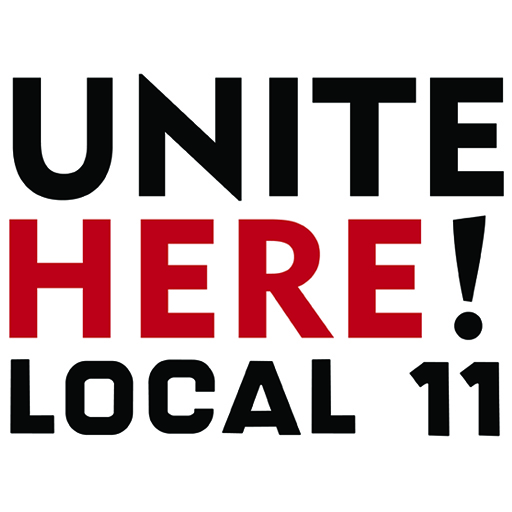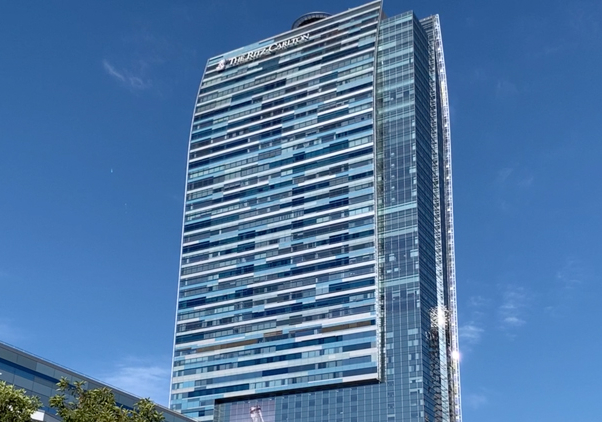UNITE HERE Local 11 represents the hospitality workers in many of the iconic hotels in LA, Orange County, and Phoenix, Arizona. We represent the housekeepers, cooks, dishwashers, servers, bartenders, and front desk agents that make your stay at these hotels so memorable. Be sure to always stay in a union hotel. And when you leave, don’t forget to tip your housekeeper!







More Perfect Union – Brenda Mendoza Profile
96% VOTED TO AUTHORIZE A STRIKE
The strike authorization vote comes after more than a month of failed negotiations with our hotel employers. Our key demands are an immediate $5 an hour wage increase to keep pace with the soaring cost of housing; affordable family healthcare; a pension that will enable workers to retire with security; and safe and humane workloads.
SoCal Hotel Workers Authorize Largest Industry Wide Strike in U.S History, 96% YES
Los Angeles, CA: The region’s largest hospitality union, UNITE HERE Local 11, representing over 32,000 room attendants, cooks, dishwashers, front desk agents, servers and food service workers, voted to authorize a strike today.
During the pandemic, hotels received $15 billion in federal bailouts and cut jobs and guest services such as daily room cleaning. In 2023, Hotel profits in Los Angeles and Orange County exceeded pre-pandemic levels, yet hospitality workers continue to struggle to afford a place to live in the cities where they work.
Top on the list of concerns for hotel workers is the rising cost of housing. In a UNITE HERE Local 11 survey, 53% of workers said that they either have moved in the past 5 years or will move in the near future because of soaring housing costs.
“I voted yes to strike because I commute two hours from my home in Apple Valley to downtown Los Angeles. I deserve to make enough money to live near where I work.” said Brenda Mendoza, a uniform attendant at the JW Marriott LA Live.
“Hotel workers who work in the booming Los Angeles’ tourism industry must be able to live in Los Angeles,” said Kurt Petersen, Co-President of UNITE HERE Local 11. “The industry shamelessly exploited the pandemic and is now reaping greater profits than ever before. Yet workers cannot afford to pay the rent. This 96% vote to authorize a strike sends a clear message to the industry that workers have reached their limit and are prepared to strike to secure a living wage.”
L.A. hotels depend on low-wage workers. Thousands have just OK’d a possible strike
VOTE YES FOR THE STRIKE
On June 8, 2023 thousands of Local 11 members will vote to authorize a strike for better wages, affordable housing, a better pension, healthcare, and fair workloads. Sí se puede!
City investigating Hollywood restaurants for allegedly keeping service fees, stiffing workers
Tourism Workers Rising Coalition to Partner with LA City Council to Raise Wage to $25 In Effort to Ensure Angelenos are Healthy and Housed
Los Angeles, CA – Tourism workers, the unions representing them – SEIU United Service Workers West and UNITE HERE Local 11 – and LA City Councilmember Curren Price are leading efforts to raise wages to be commensurate with a world-class tourism economy and world-class city. The proposed ordinance introduced by Price on April 12 would raise the wage for tourism workers to $25 an hour in 2023 with plans to increase their pay to $30 by 2028.
“LA’s tourism industry thrives on the hard work of its employees. But right now, minimum wage workers must work over 100 hours a week just to afford an apartment in LA,” Councilwoman Katy Yaroslavsky co-presented the ordinance. “It’s time to raise the wage and make sure that the people who make Los Angeles a world-class destination can actually afford to live here.”
“My rent is going up to $1,400, and I care for my adult son with schizophrenia. I’m worried because I don’t want to end up on the street like so many others in the city,” said Graciela Gomez, member of UNITE HERE Local 11 and housekeeper at the Four Points Sheraton LAX for 23 years
“A $25 minimum wage would mean we do not have to live paycheck to paycheck. We would be able to afford reliable transportation to and from work and pay our utility bills in full instead of little by little,” said Gary Duplessis, cook at Flying Food Group for six years.
“The status quo at LAX is broken. The aviation industry receives billions in taxpayer dollars – including $54 billion of pandemic relief to big airlines and billions more in public funding for airports,” said SEIU United Service Workers West President David Huerta. “LAX is set to receive billions in investments to prepare for the World Cup and the Olympics. While corporate CEOs and airline executives are reporting record revenues, yet the very workers – mostly Black, Brown, and immigrant workers– who make their profits possible can’t afford to pay rent, pay for healthcare, and are forced to work two or more jobs to make ends meet. The City of LA can and must do better. We’re excited to launch the Tourism Workers Rising campaign to improve the working conditions at LAX so that all airport workers and their families have access to affordable healthcare and wages that allow them to thrive.”
Former Loews Hotel staff to be re-hired by Regent
L.A. Hotel Workers Fight an Uphill Battle to Live Where They Work
THE RENT IN LA IS TOO! DAMN! HIGH!
Over a thousand room attendants, cooks and servers with tools of their trade–beds, bell carts, mops–marched in downtown LA today asking the hotel executives attending the American Lodging Investment Summit, “the largest hotel investment conference in the world,” to step up and help solve the region’s housing crisis.
Responsible Hotels Ordinance
Spread the Word
Only 23 to 34 percent of Paycheck Protection Program dollars went directly to workers who would otherwise have lost jobs, according to an analysis by the National Bureau of Economic Research. See also “PPP In Name Only.”